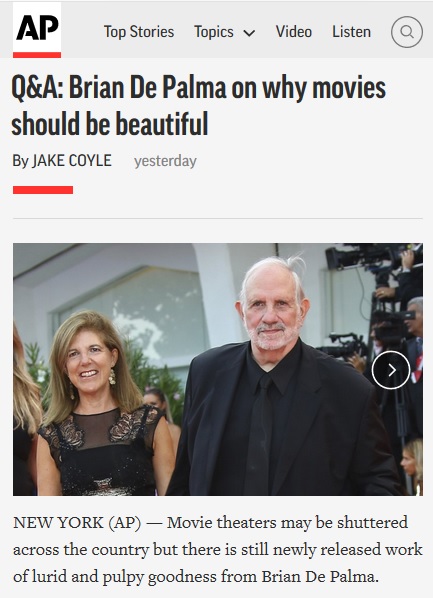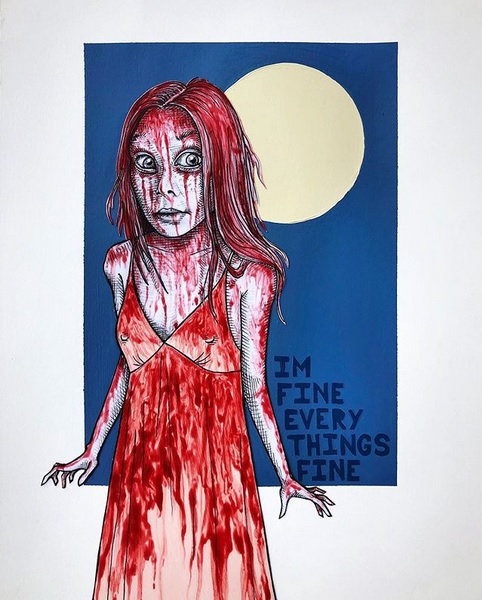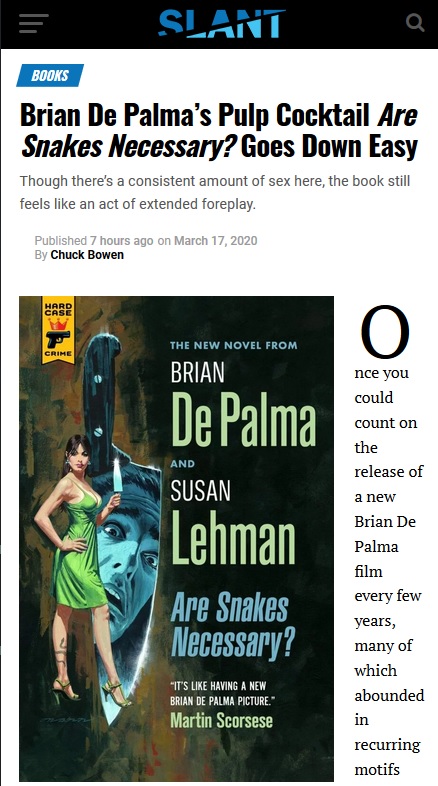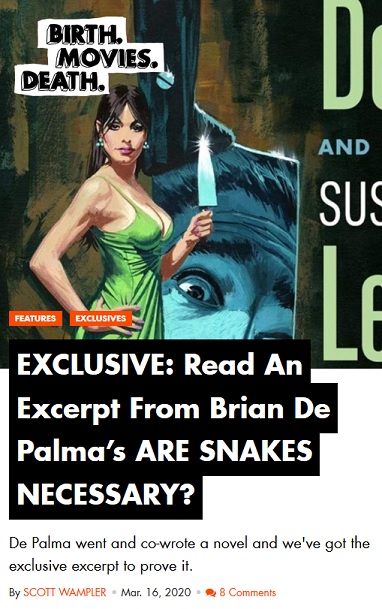"You've got to believe in the movie when you make it." That is one of the key statements
. Read on, also, as De Palma tells Coyle his new title for what has, up until now, been known to the public as
NEW YORK (AP) -- Movie theaters may be shuttered across the country, and projects delayed, but there is still newly released work of lurid and pulpy goodness from Brian De Palma. The 79-year-old filmmaker has written his first work of fiction, "Are Snakes Necessary?" a crime novel he penned with his partner, Susan Lehman, a former editor for The New York Times. The book, full of snappy dialogue and sharp knives, bears plenty of the hallmarks of De Palma. Movies are baked into it (the title refers to a book Henry Fonda is seen reading in "The Lady Eve"). Martin Scorsese sums it up in a blurb: "It's like having a new Brian De Palma picture."
Just over two weeks ago, I drove out to East Hampton to meet De Palma (the director of "Carrie," "Scarface," "Body Double" and "Carlito's Way") at an inn near his and Lehman's Long Island house.
The conversation spanned his new book (a John Edwards-inspired tale about a senator having an affair with a young staffer), his grim thoughts about the advent of streaming ("The industry is eclipsing the artistry") and his plans for a movie partly inspired by Harvey Weinstein.
An abiding passion for cinema coursed through De Palma's reflections. Lately, he's been soaking up westerns. The day before, he said, he watched John Ford's "My Darling Clementine" again —- a movie De Palma, noted, that knew how to shoot a shoot-out.
Q: Why is "Are Snakes Necessary?" a book and not a movie?
De Palma: Too many ideas and not enough time to make all the movies. You write a lot of stuff that never makes it into a movie. With my partner, Susan, we just basically did it because we had fun doing it. We had never written a novel before, neither of us. I had an idea for a script I had never developed based on the Edwards campaign and the girl (Rielle Hunter, the woman he had an affair with) making webisodes, those little intimate things she shot. As I was watching this happen, being a director, you can see someone flirting with the camera. We started with that.
Q: Has the straightforward process of fiction writing been a welcome alternative to the struggles of filmmaking for you? Your last film, 2019's "Domino," had financial difficulties and wasn't released in the U.S. [a la Mod editor's note: Domino did have a limited release in U.S. theaters]
De Palma: It's a very sad situation. It was under-financed. I was there 100 days and shot 30. They weren't paying anybody and I had a whole bunch of people working for me. We finished it. But I was so disenchanted with the people who financed it ... that I said, "Guys, here it is. Good luck." And I didn't do any publicity for it.
Q: Did that sour you on making more films?
De Palma: I had never been in a situation like that except way back when I first was starting to make independent films like "Sisters," which I think was budgeted at $150,000.
Q: What struck me reading your book is how enduring your obsessions are. "Vertigo," for instance, makes a cameo. In the book, it's being remade.
De Palma: It was a very influential movie. I saw it in 1958 in Vista Vision, I might add, at Radio City Music Hall, I believe. It left a very strong impression on me, obviously. As I've gotten older and made a lot of films, I can see there's always lessons to be learned from Hitchcock the way he sets up certain sequences. And "Vertigo" is the whole idea of creating an illusion and getting the audience to fall in love with it and then tossing it off the tower twice. Very, very good idea.
Q: Are there any Hitchcock films you don't like?
De Palma: I thought the late Hitchcock stuff was not that good. When he got finally discovered by the French and all the critics started to write about him, that's when he was in his decline, I thought. I don't think he ever reached the pinnacle that he did after "Psycho" and "Vertigo."
Q: Do you think of your career as having a pinnacle?
De Palma: Sure. I've studied directors' careers my whole life. Susan doesn't like me to say this, but you get older. You have a very good creative period, but if you're making decent movies after you're 60, it's kind of a miracle.
Q: What's that pinnacle for you then?
De Palma: In my mid-50s doing "Carlito's Way" and then "Mission: Impossible." It doesn't get much better than that. You have all the power and tools at your disposal. When you have the Hollywood system working for you, you can do some remarkable things. But as your movies become less successful, it gets harder to hold on to the power and you have to start making compromises. I don't know if you even realize you're making them. I tend to be very hard-nosed about this. If you have a couple of good decades, that's good, that's great.
Q: You must have gotten accustomed to your films, years after critical or commercial disappointment, reemerging as cult classics.
De Palma: You've got to believe in the movie when you make it. The fact that the audience didn't respond to it and 30 years later they think it's a masterpiece is always gratifying. Your instincts were always right. I've always said that the movie you make is measured against the fashion of the day. That shouldn't stop you from trying to do what you think is correct, what works for you.
Q: A few years ago at the Tribeca Film Festival, I saw a restoration of "Scarface" and was overwhelmed by the colors. I don't normally sit up close in a theater, but I did then.
De Palma: I did, too. I hadn't seen "Scarface" in years. I'm always amazed by the performances. The acting, it's like, "Yikes." It doesn't get old. It's extremely vivid.
Q: Do you think that kind of bold, widescreen filmmaking is still being practiced?
De Palma: The things that they're doing now have nothing to do with what we were doing making movies in the '70s, '80s and '90s. The first thing that drives me crazy is the way they look. Because they're shooting digitally they're just lit terribly. I can't stand the darkness, the bounced light. They all look the same. I believe in beauty in cinema. Susan and I were looking at "Gone With the Wind" the other day and you're just struck at how beautiful the whole movie is. The sets, how Vivien Leigh is lit, it's just extraordinary. If you look at the stuff that's streaming all the time, it's all muck. Visual storytelling has gone out the window.
Q: Is that what irks you most about today's films?
De Palma: The whole system is changing. You used to go out and make a movie. Our generation, we wanted to take over the studios. Which we did. I think what's so interesting about the generation I came up with, they got very rich, extremely rich, working within the studio system. Now, we're into this endless streaming. Everything has 10 parts and six seasons. It's sort of moved back to the old studio system where the producers and the writers are the king. The directors, who knows who directs one of these things from another? Then you have the whole Marvel universe, which is digital action stuff, all computer generated. When I made "Mission to Mars" and spent a year working on these shots with three or four digital houses -- one was working on the ship, one was working on the smoke, one was working on the dust -- I would storyboard a shot and it would keep coming back to me for a year as they added things. The shots are hopelessly expensive. You say: "What am I doing?" That's when I went to Europe and said I can't make movies like this anymore.
Q: "Mission: Impossible" is up to, what, it's seventh installment?
De Palma: Stories, they keep making them longer and longer only for economic reasons. After I made "Mission: Impossible," Tom asked me to start working on the next one. I said: "Are you kidding?" One of these is enough. Why would anybody want to make another one? Of course, the reason they make another one is to make money. I was never a movie director to make money, which is the big problem of Hollywood. That's the corruption of Hollywood.
Q: Are you still working on the Weinstein-inspired project, "Predator"?
De Palma: Yes, but I had an original title I went back to. When I heard about the whole "catch and kill" thing with the Trump scandals, I immediately said that's a great title -- long before Ronan (Farrow) got a hold of it. Fortunately, I copywrited it. So it's "Catch and Kill" now. It's basically a horror movie based on real things that have happened in the news.
Q: And inspired especially by Weinstein?
De Palma: Harvey Weinstein is part of it but being in Hollywood in the '70s, there were some abusive actions going on that irritated me quite a lot. When I was casting "Carrie," George Lucas and I were seeing every young actor in Hollywood.
Q: He was casting "Star Wars" at the same time.
De Palma: Yes, we were casting together because we were looking at all the young people. There was one director-actor who was also casting a movie and he was trying to (expletive) these girls while he casting -- which got me extremely annoyed. As a director, it offends me because the actor is just trying to get the job. To take advantage of that it, it's like a doctor doing something against the code of ethics. There was a particular actor-producer that was doing this and that's the sort of centerpiece of "Catch and Kill." The Harvey Weinstein character wanders into this. It's scary and it's fun.
Q: Do you have a target for shooting "Catch and Kill"?
De Palma: Hopefully in August.
Q: Women in your films has always been a flash point. Some have called your movies misogynistic. The bloody drill-bit scene in "Body Double" is hard to imagine happening today.
De Palma: That was the movie that was attacked relentlessly when it came out, but I can't tell you how many people come up to me and talk to me about "Body Double."
Q: Do you feel time has disproved those criticisms?
De Palma: They always considered I was somehow a misogynist director because I had women as focal points in my thrillers. Well, I'm sorry. I prefer to photograph women walking around rather than men. (laughs) I think some great philosopher once said: The history of movies is of men photographing women. I've always said: "If I have to follow somebody, I'd rather it be a beautiful woman than Arnold Schwarzenegger." I'm sorry.
Q: Hitchcock lamented never getting to film certain sequences he had always envisioned. As a practitioner of such set pieces ("Untouchables," "Carrie"), are they any you wished you had shot?
De Palma: Yes, they go into the books. I constantly point out whenever I'm asked about these long visual sequences and why they work -- and I never quite realized I was doing it -- when you have an action sequence, you've got to lay out the geography. The trouble is with 99% of directors, they don't. Hitchcock knows how to do it. I know how to do it. (Steven) Spielberg knows how to do it. (Stanley) Kubrick knows how to do it. You have to lay out the geography of the location so the audience knows where everything is before you set the action going, whether it's two armies colliding, it's a shootout in a train station or it's Cary Grant at a crossroads in the Midwest. The key is that you've got to slow everything down. If you look at every shootout you see, you have no idea where anything is. I've said this a thousand times and I think I'm the last practitioner. I'll go to the grave with it.
Q: Scorsese has wondered before how many movies he has left. What's your expectation?
De Palma: I think we're getting near the end here. I have a bad knee. William Wyler said when you can't walk, it's over with. Now, if you write these books, that can use up our creative imagination. But as long as I can do it, I will do it. But I'm not going to miss not doing it. (laughs)
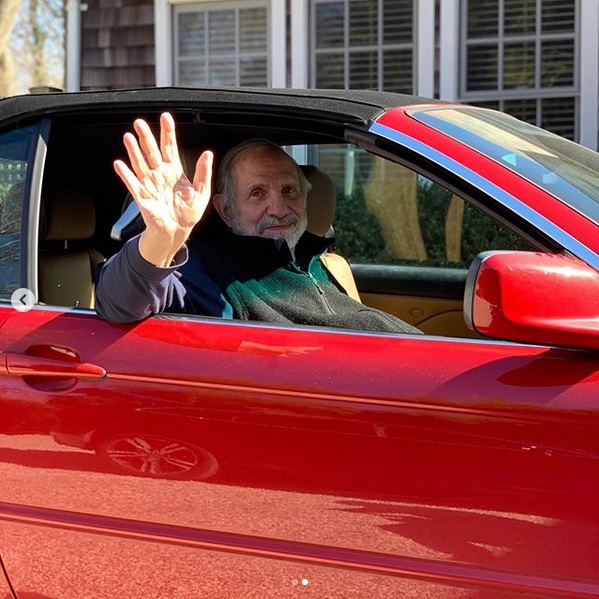 David Koepp posted two pictures of Brian De Palma yesterday on his Instagram page, with the following caption:
David Koepp posted two pictures of Brian De Palma yesterday on his Instagram page, with the following caption: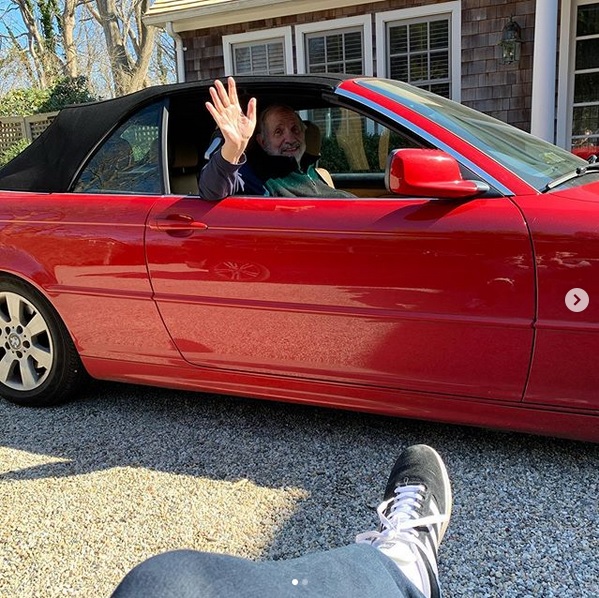




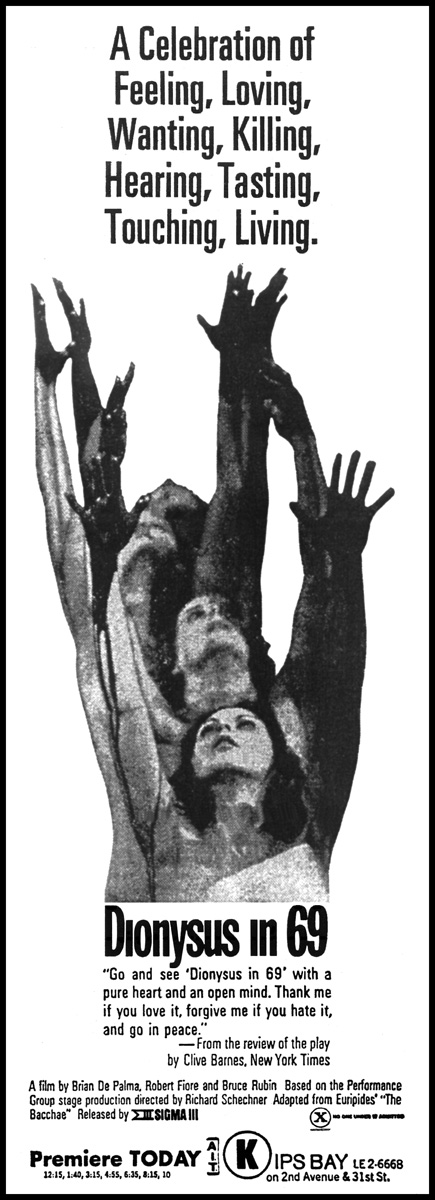


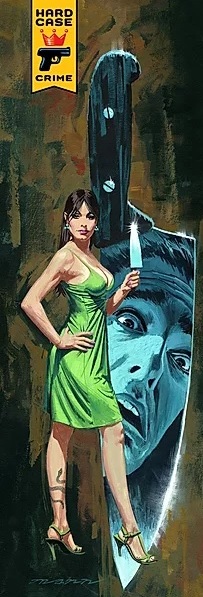 Two more reviews of Are Snakes Necessary today from the U.K. --
Two more reviews of Are Snakes Necessary today from the U.K. --